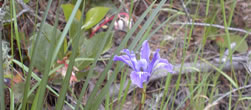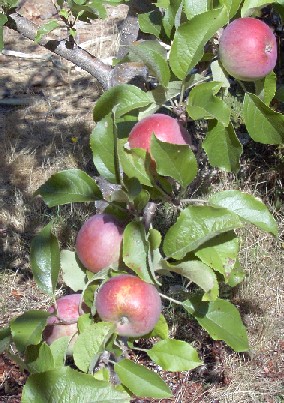 |
 |
|||||||
"salus
populi est suprema lex,"
the prosperity of the people is the supreme law
Of Aphids, Ants, and Apples
Aphids are a perennial problem in the garden. I want to add a new twist to dealing with them when they are a problem on fruit trees, in my case apple trees.
I am trying to garden organically. I am not hard-core about it, I just don't want to poison the food I eat or my property (or my well). I planted three apple trees when I first cleared my garden area back in the autumn of 1998: a Fuji, a Braeburn, and a Kidd's Orange-Red, all on the same semi-dwarf rootstock. Here's an entry from my garden journal I started in 1999: "At first they did well, but they were attacked by aphids. I decided to let nature take care of them, which eventually happened, but it stunted the growth of two of them."
Aphids will attract aphid eaters, but often not fast enough to allow the plants they victimize to grow at a healthy rate. Among the aphid eaters are wasps (both predatory and parasitic), lady bugs, and lacewings. It is possible to buy lacewings and ladybugs to release, but there are two problems I have found with this approach. One is that once aphid populations drop, so do the populations of predators, which means it is possible to have another aphid growth spurt that harms your plants.
The other problem is ants. Certain kinds of ants will protect aphids from predators; I have such ants in my garden. I don't consider seeking out and destroying the ant colonies as a good option. Ants have a generally beneficial role in the garden. And they just come back unless you keep your garden permanently poisoned; the only thing that deters ants, ultimately, is other ants.
So you can crush the aphids by hand, if you are not squeamish. That worked pretty well when I just had 3 small apple trees, but now I have much more to attend to, and other problems besides aphids.
You can hose the aphids off, but this is of limited effect, they come back quickly, and the spray can spread fungal diseases.
A cheap and effective method is spraying with soapy water. This kills the aphids and even the ants, but not all of them and the ants will quickly move back in. If this method is used it must be used once per week.
The next step upward is spraying with an oil. You can by commercial oil sprays, but I make my own from soapy water and canola oil. The soap disperses the oil. This is very effective. It kills the ants and aphids. But it leaves a messy-looking tree and kills aphid predators too.
So this year I tried something new. Two new things. I released lacewing eggs and larvae I bought from Gardens Alive (there are many other suppliers). That did not do the trick because of the ants.
Instead of spraying oil on all the parts of the trees, or even on the places most infected with aphids (usually the tip-growth areas), I took a paintbrush and coated about a foot of the lower trunk of each tree with canola oil. It took only a tiny amount of oil.
Sure enough, the ants did not like it. To us the oil is a thin film, but ant-scale it is a marsh of a substance that causes them to suffocate. The trail of ants up and down the trees came to a halt. This did leave some live ants stranded in the trees. Eventually they mired themselves in oil and died, or they jumped off. Four days later no ants.
Now the predators are going wild. They will fatten on aphids and reproduce. The aphid and predator populations will fluctuate on the typical carnivore/herbivore fashion.
The and farmers have been eliminated. They upset the ecology. My apple trees look like they set a bumper crop this year. Not to disparage the Braeburns or Kidd's Orange-Red, but my Fuji's are famous for their size, beauty, and flavor.
Unfortunately, out in the greater world we humans are now sucking the planet dry. We farm ourselves and have no predators. Unless we learn to limit our numbers, sooner or later those numbers will crash from disease, starvation, or war. To see more of my writing on the population issue, follow this population link.
- William P. Meyers
Useful link: More than you ever wanted to know about aphids
My Fuji apples:
